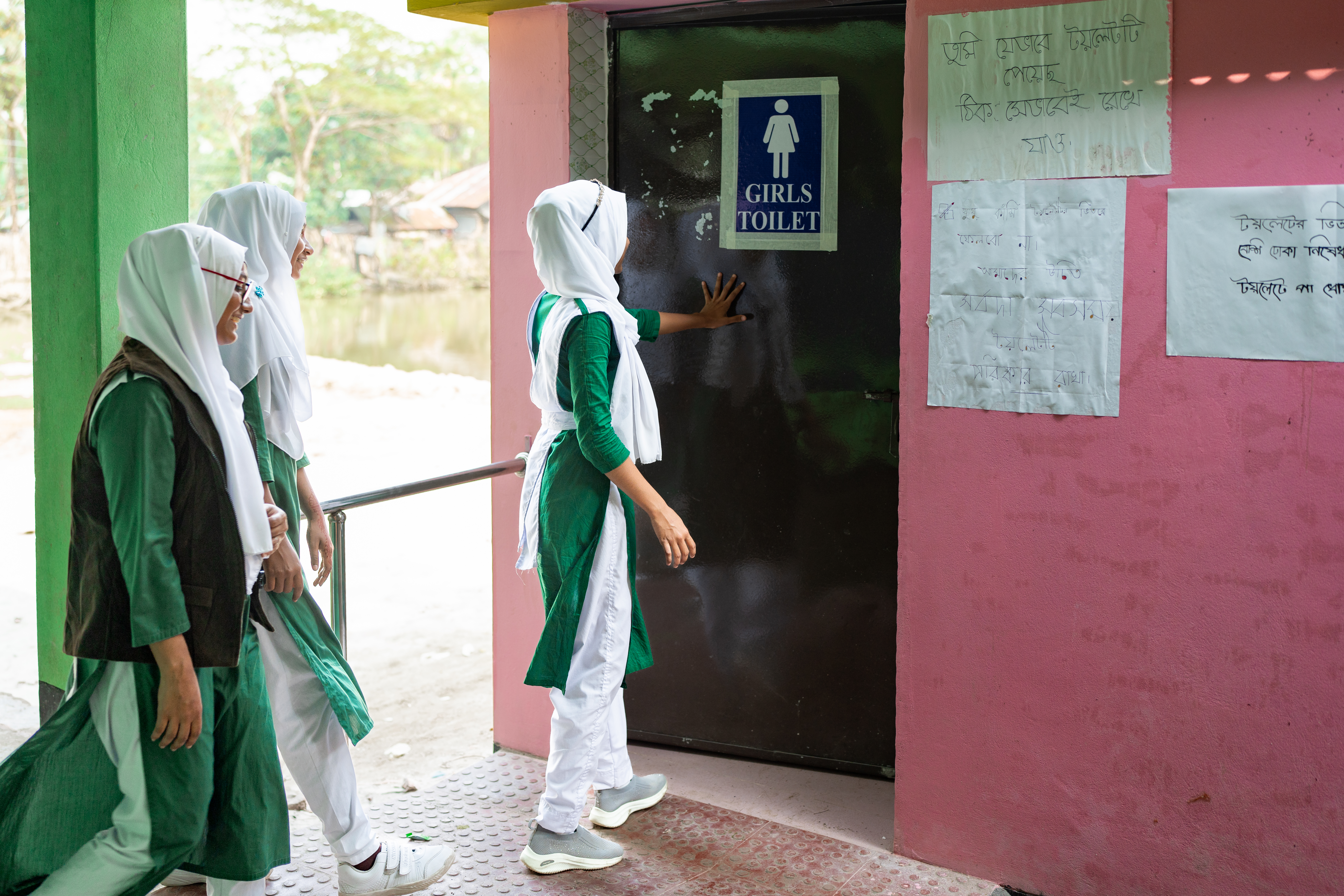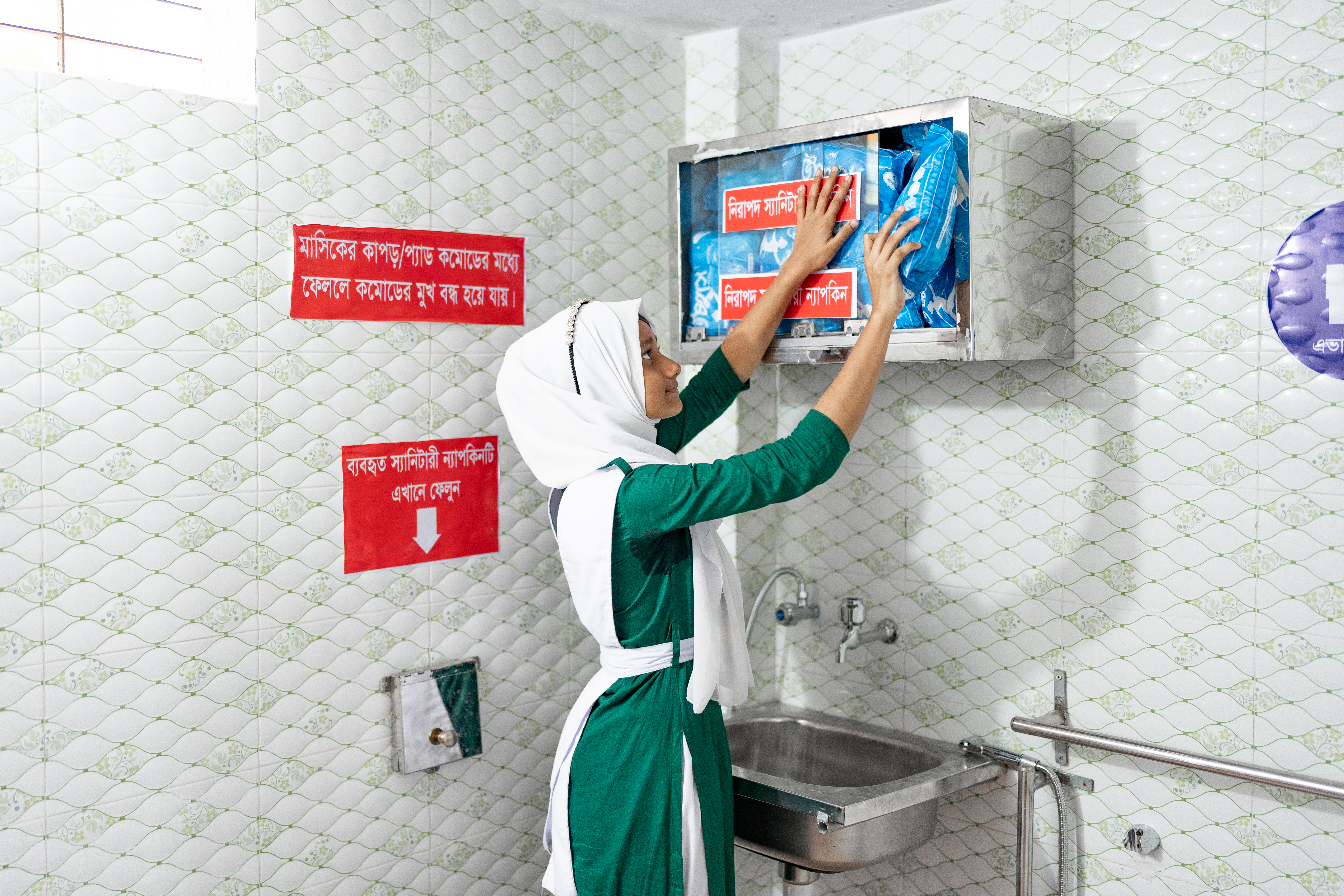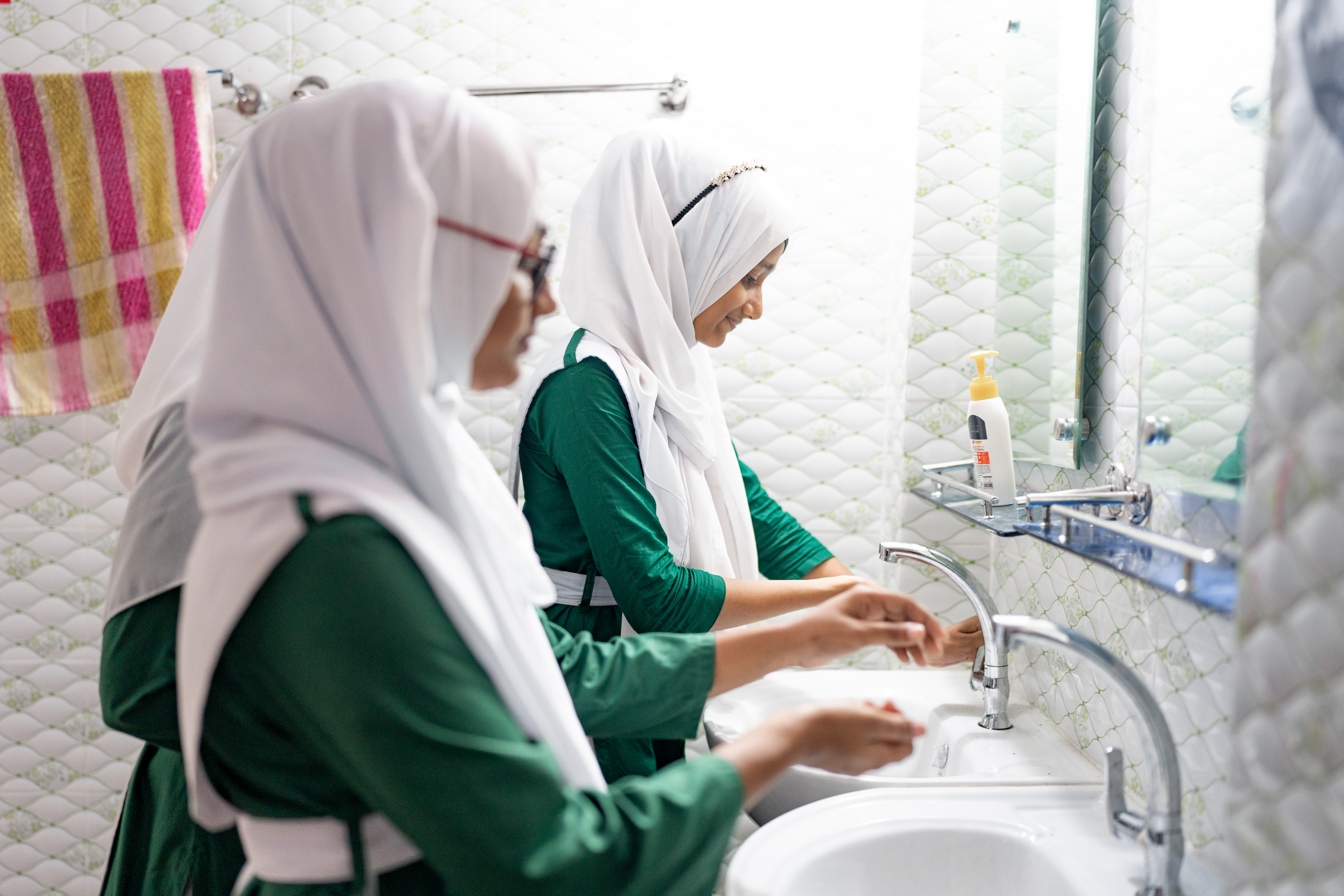The clock on the dash reads 6:07 a.m. as we pull away from the guest house. For the first time on this trip to Bangladesh, we have the road almost entirely to ourselves. Aside from the toll booth attendants, the rest of Pirojpur is still waking up.
 Even the sun has only stretched the first of its tendrils across the horizon. Fog still rests heavy on the trees and blankets the river. Every edge is blurred and anything at a distance is indistinguishable. It seems to say, “Today doesn’t know what it’s going to be.”
Even the sun has only stretched the first of its tendrils across the horizon. Fog still rests heavy on the trees and blankets the river. Every edge is blurred and anything at a distance is indistinguishable. It seems to say, “Today doesn’t know what it’s going to be.”
I can’t say the same for the girl we’re going to see. She knows exactly what she’s going to be — she told me yesterday. As I glance at the time again, I clock that she’s already been awake for at least an hour.
Her goals, her reality, and her determination have — until recently — left little room for rest.

Meet Jui
“I understand very well how much it hurts to get sick,” Jui reflected.
 She sat across from me in a red plastic lawn chair. Hair pulled back. Orange orna around her neck to match her salwar kameez. The undercurrent of nerves at the start of the interview had dissipated and been replaced with a kind confidence. The story she told was one of dirty water.
She sat across from me in a red plastic lawn chair. Hair pulled back. Orange orna around her neck to match her salwar kameez. The undercurrent of nerves at the start of the interview had dissipated and been replaced with a kind confidence. The story she told was one of dirty water.
The water, she explained, had caused a skin disease so severe that she spent seven days in the hospital. Her stay was accompanied by a regimen of medication and injections, and even when she was sent home, she faced another month of recovery. That meant even more time out of school. For an avid student like Jui, that side effect was one of the most painful.
“It took me almost one month to recover, so I missed school,” Jui shared. “I had to study under a lot of stress due to exams, but I still couldn’t do well.”
The skin disease was just one interruption to Jui’s education. Once a month, another threat came calling — for Jui and every other girl at school.

Two Years of Terrible
“Suffering” was the word Jui used to describe how she spent her first two years at school. Mostly because of the sheer lack of toilets.
For 375 students, there were two: one for boys and one for girls. To make matters worse, there was little access to clean water. The single rainwater harvesting tank on campus usually ran dry one month after the monsoon season ended.
Now add periods.
Managing menstrual hygiene with one toilet and no water? That’s best described as impossible.
Jui told us how much the girls hated getting their periods. She talked about how other students wouldn’t sit by anyone who had it. How the boys would tease. How shame crept in.

Caught in the Cycle
In some way, you might be able to relate to Jui’s suffering.
If you’re a menstruating person, perhaps debilitating cramps kept you curled in bed for a day (or days). Maybe the anxiety of bleeding through made you dread going to school. Maybe nausea kept you close to the toilet.
It was the anxiety for me. I hated asking teachers for a bathroom pass, terrified that they would ask why. I wore long sleeves to better hide tampons inside the cuff when walking to the bathroom. And when the weather was too warm for long sleeves, I made sure my outfit had pockets.
Heaven forbid someone saw me carrying the supplies I needed.

I now know that millions of people around the world share this experience with me. In a study from Bhutan, 33% of girls said they miss school during their periods because they’re afraid others will make fun of them. Jui’s experience was echoed in the study, too.
“I miss school during my period because there isn’t anywhere for girls to wash and change at school. (25%)”
“I miss school during my period because there is nowhere to dispose of sanitary pads. (21%)”
Research further, and you’ll find these concerns are far from unique. Missing school due to menstruation and limited sanitation is incredibly — and unfortunately — universal.

Girl Math
At first glance, a few missed days every month may seem negligible.
It’s not.
For every day missed, girls have to work harder the next. For every week, their educational and career goals get that much more difficult to achieve. They quickly find themselves playing an inescapable, never-ending game of catch-up. It restarts every month, and no one ever wins.
Some girls drop out entirely. And by some, I mean millions. In India alone, it’s estimated that 23 million girls drop out of school every year due to menstruation.
But let’s assume a girl stays enrolled, and let’s use Jui’s school as our example. What toll does missing school every month really take?
 Jui’s school is in session for approximately 170 days every year. The average menstrual cycle is 28 days, and the average period lasts five. That means a female student at Jui’s school will have approximately six menstrual cycles in 170 days.
Jui’s school is in session for approximately 170 days every year. The average menstrual cycle is 28 days, and the average period lasts five. That means a female student at Jui’s school will have approximately six menstrual cycles in 170 days.
Do the math, and you’ll realize that’s up to 30 missed school days per year. Do a little more math, and you’ll find that’s 17.6% of the school year overall.
For comparison, missing 10% of school is considered “chronically absent” in the U.S. and the U.K.

No Days To Waste
Jui doesn’t have time to miss 17.6% of the school year. Neither do her friends. Not when their ambitions include careers like doctor, pilot, lawyer, and judge.
Of that bunch, Jui is the lawyer. Because, like all 14-year-old girls, she dreams of ending corruption and crime. She wants to bring justice to poor communities, and she believes clean water, sanitation, and hygiene can help her get there.
How, exactly? She had a beautiful answer for that.
“People need to be healthy — physically, mentally, and in every way. We can be healthy physically and mentally when we find a different kind of strength within ourselves. When we find joy. When we find happiness. And in keeping us healthy, water and cleanliness play a big role.”

New Year, New Era
When Jui imagined having more toilets and clean water at school, she imagined a life with less worry. She rattled off how she would no longer need to ration her drinking water, wait for a toilet, or struggle to maintain personal hygiene. With access to water and sanitation, she would simply be “very happy.”



Across Bangladesh, charity: water works with local partners like Helvetas to bring clean water, sanitation, and hygiene facilities to communities and schools. Jui’s school was one of the projects on Helvetas’ list. In January 2024, they handed over the keys.
Two gleaming new bathrooms and a 40,000-liter rainwater harvesting system were officially complete. In that moment, Jui said she felt “a different kind of happiness.”
Our team marveled during the tour at how nice the bathrooms were, even quipping that we may have to skip taking photos. Without context, someone might think they were looking at a hotel. But, we’ll oblige.
Maintaining these stunning new facilities is the responsibility of an adult caretaker and the Student Cabinet. The Student Cabinet is a group of peer-elected students who help take care of the project and encourage new hygiene norms. You can guess who was voted in.
That’s right, Jui. And not only voted in — Jui was elected captain. That’s like being president.
As Jui put it, she was chosen by her peers because of her enthusiasm for the project. They have faith that she will keep the school “comfortable.” Jui has more than risen to the occasion.
Every day, she makes sure that the new facilities stay clean and functional while also placing herself firmly on the frontlines of changing social norms.
“I used to be ashamed of these things [periods]. I thought, ‘If boys know about this, I’ll feel horrible.’ Now I think, ‘Why should girls lag behind due to this natural reason? Why should boys move forward? Everyone has equal rights.’”

From Here, Forward
On the day the water project and bathrooms were completed, the path for Jui’s dreams cleared — but not completely. Water, sanitation, and staying in school will make them easier, but there are hurdles still ahead. Ones, thankfully, Jui’s family is ready to help her face.
“I tell her, ‘Don’t walk back. Keep going forward. That’s how we want you to see all of the goals you want to achieve,’” Jui’s aunt shared.
Her grandfather added, “I recognize that I cannot support much financially, but I tell her, ‘Any emotional or mental support you need, we are here for you.’”
Her aunt went on to say that she believes Jui will make an excellent lawyer, sharing that Jui always speaks against injustice and never stays silent. And now, thanks to the new facilities at school, she believes Jui’s dreams are even more of a possibility.
 “In my time, water was one of the reasons we had a lot of sickness and missed school. Now, nothing will stop these kids. My daughter and my niece Jui — they will go really far without going a step back.”
“In my time, water was one of the reasons we had a lot of sickness and missed school. Now, nothing will stop these kids. My daughter and my niece Jui — they will go really far without going a step back.”
Jui is well aware of her obstacles. She knows it’s expensive to become a lawyer, and she knows her family’s finances are limited. That’s why she works so hard at school, attending her usual classes and three additional tutoring sessions every morning.
It’s also why she accepted the role of Student Cabinet Captain. She knows that every extra day spent in school gives girls like her an advantage.
“We used to return home before. Now we don’t have to. So, I think girls are no longer behind the boys in any field.”

Free
When you think of the things that have historically hindered a girl’s ambition, toilets probably never topped the list. Basic needs are sneaky that way. It’s difficult to see how transformative they are if yours have always been met.
But now we know.
Today, we can see a bathroom, a sink to wash hands, and a drinking fountain flowing with clean water for what they are: life-changing resources. They are safe spaces. Assurances of equitable access that have too long been denied.
Those spaces and that access? They can free an entire generation.
Of course, we can’t say exactly where Jui’s life will lead. Like morning fog, the future is always a little murky and a little undefined. But we have no doubt that Jui will stay right at the helm — back straight and gaze focused as she navigates toward her goals with her fellow girls alongside.
After all, they have places to go and people to be. No basic need will again get in their way.
Period.

Give for the girls
Jui is just one girl representing millions who still struggle to attend school and manage their periods. For just $40 a month, you could bring a girl like Jui access to clean water and sanitation.
Join us in empowering the next generation.
Give Now
Photos by Cubby Graham and Nihab Rahman
Videos by Kelly Herrington
Trip production by Joy Caroline Hicklin

